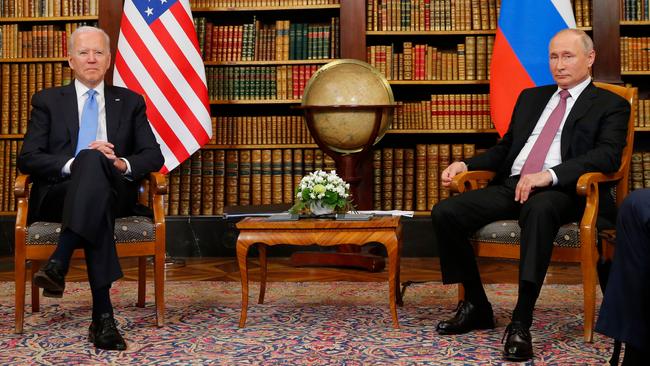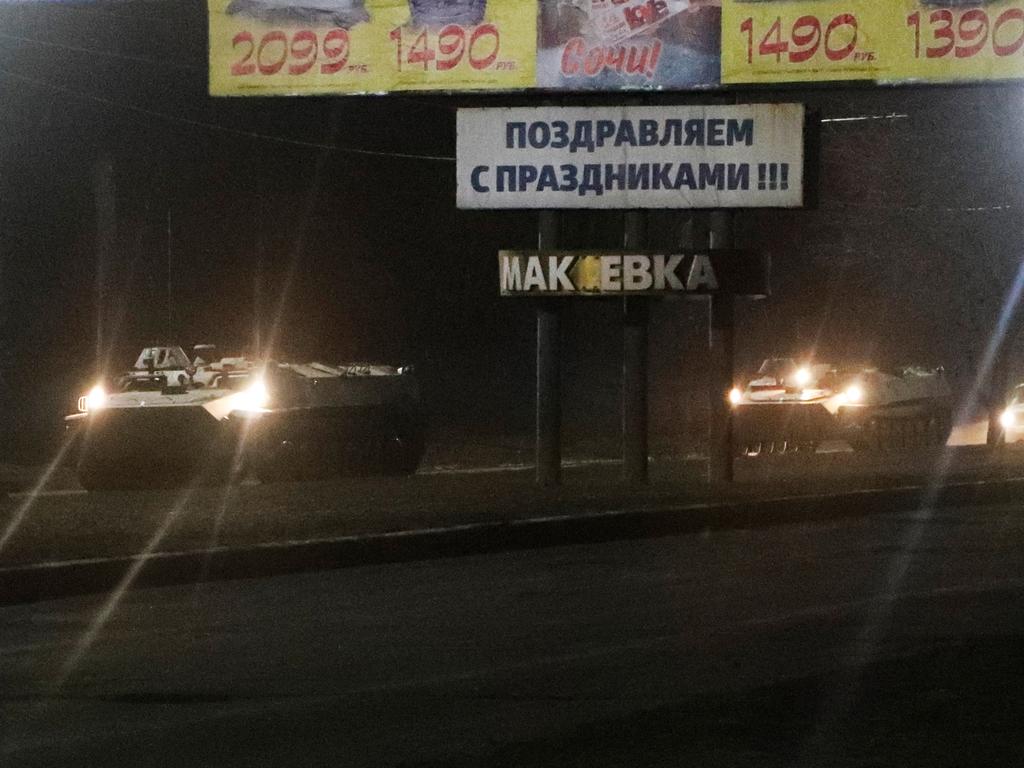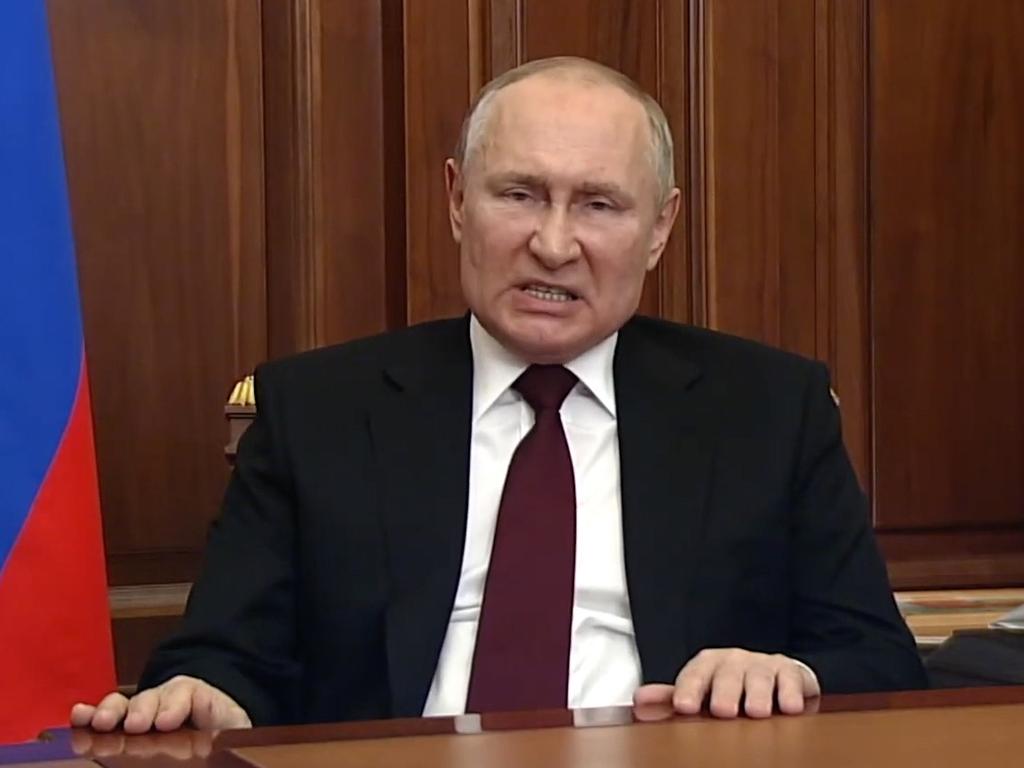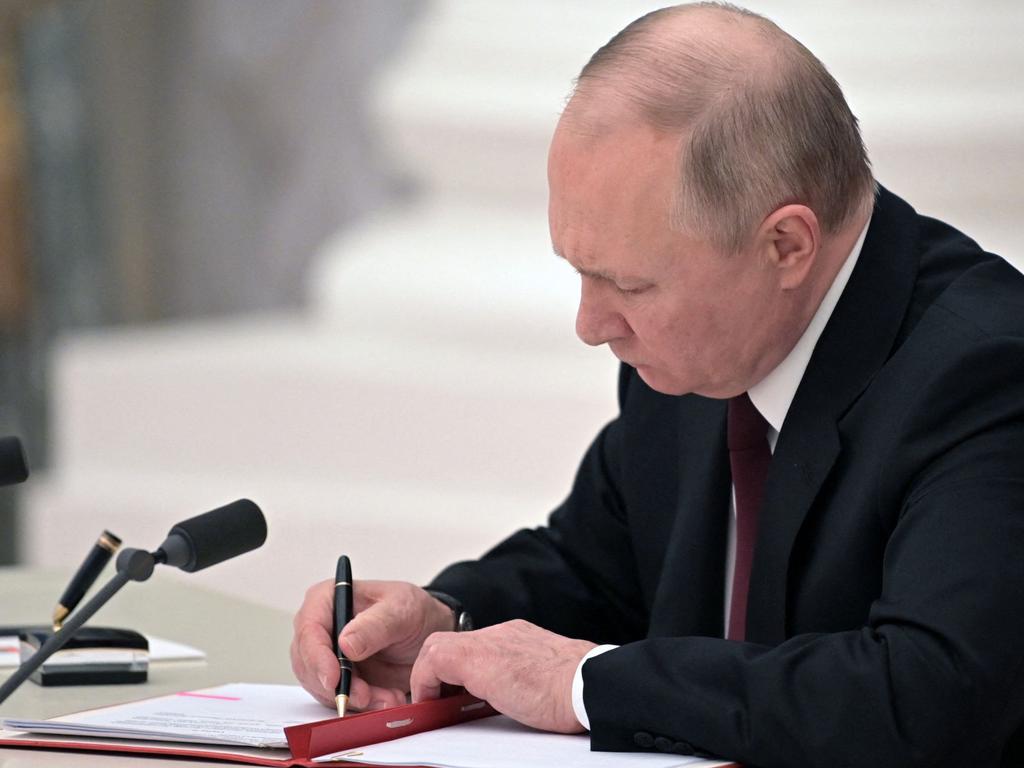
In his hour-long epic recitation of Russia’s historical grievances, Putin issued a blood and soil claim on all of Ukraine, declaring: “Modern-day Ukraine was in full and in whole created by Russia, Bolshevik, communist Russia to be precise.”
By this declaration Putin repudiates Ukraine’s existential statement of its nationhood and refuses to accept its rejection of Mother Russia.
This will become the greatest strategic test so far for US President Joe Biden after his Afghanistan withdrawal fiasco. Biden faces an exacting challenge – he will correctly shun any direct US military response but must also demonstrate by his response that Putin will be the loser, not the winner. With Biden’s leadership in the spotlight he needs to break decisively from the Obama syndrome of acquiescence before the authoritarian powers.
In his speech, Putin said Ukraine was “not just a neighbouring country” but “an integral part of our own history, cultural, spiritual space”, with the people of Ukraine “connected with us by blood, family ties”. This defies the idea of Ukraine as a nation with majority support for its independence based on an ethnic Ukrainian population and a sizeable Russian minority that also creates an internal fracture.
At the heart of this struggle is the irreconcilable conflict between Putin’s throwback conception of Russia – arising from his belief that “the break-up of the Soviet Union was the greatest geopolitical tragedy of the 20th century” and the Western expansion of NATO to Russia’s borders designed to validate the independence of former Soviet republics.
In an astute and chilling tactic Putin, conducting a formal ceremony in the Kremlin, has recognised the independence of two Moscow-backed separatist regions in the east, Donetsk and Luhansk, where pro-Russian rebel forces dominate. Remember, however, these separatist regions claim vast territory they do not control and that are held by the Ukrainian army. This internal conflict dates back to 2014 with more than 12,000 casualties.
Using his recognition as a pretext Putin has ordered Russian forces into these regions on what he brands a “peacekeeping” operation with every sign this will become a permanent military presence seeking the effective division of Ukraine. This is an act of war and a contempt for international law.
The next question is whether the Russian army will extend its campaign beyond these regions given that Putin’s emotional speech – revealing his ultimate intent – sought to delegitimise the Ukrainian nation along with blame-shifting to Kyiv.
“As for those who captured and are holding on to power in Kyiv: we demand that they immediately cease military action,” Putin demanded. “If not, the complete responsibility for the possibility of a continuation of bloodshed will be fully and wholly on the conscience of the regime ruling the territory of Ukraine.” This is the time-honoured language of invading dictators – blame your victim.

Australia is not directly involved but it will be deeply affected. This is a pivotal event for Ukraine but a larger event for the global power struggle. Scott Morrison’s warnings about a more dangerous world – essentially driven by China’s assertion and bullying – look even more prescient given Putin’s resort to 20th-century military invasion and lust for aggrandisement.
Deeper forces are at work – cultural xenophobia, fervent nationalism and the ambition of authoritarian states. Don’t think peaceful liberal democracy is the natural order of human nature. It isn’t. A stable and peaceful order has to be built with incentives and disincentives. The dreams of the past generation about an enlightened order based on interdependent cosmopolitanism are now being further undermined.
It is true the West’s post-Cold War arrogance in the 1990s and NATO expansion helped to seed Russia’s paranoia, but this cannot be used as any excuse for Putin’s actions today. The stakes are enormous. Putin has laid an audacious challenge to Biden, Europe, the Ukrainian government and the concept of collective security on which Australia depends. He has surrounded Ukraine with more than 150,000 troops and can decide how and when he intensifies the military pressure.
Putin should not be underestimated – don’t forget that contrary to initial expectations he was a winner from his Syrian military intervention. His core calculation must be that US-led retaliation cannot seriously damage him and that the West is locked in historic weakness.
This judgment will be validated or falsified before the world. Biden cannot be criticised for avoiding a military response – that would be devastating folly. Biden knows China remains the central strategic challenge for the US and it cannot engage in military retaliation on the Russian border. So far, Biden’s actions have been significant and smart.
He has secured a substantial US-European agreement on sanctions – presumably to be announced within days. He has been prepared to turn US intelligence into a public soft power asset by discrediting ahead of time any Russian pretext for military intervention. Every public warning from the US has been verified, notably Biden’s recent statement that Putin had decided to invade.
Beijing has felt obliged to move to an equivocal stance – it wants to bandwagon with Putin against US power and leadership but China believes in territorial sovereignty and it has little to gain from any Russian war on Ukraine. Foreign Minister Wang Yi told the recent Munich Security Conference: “The sovereignty, independence and territorial integrity of any country should be respected and safeguarded. Ukraine is no exception … We hope a solution can be found through dialogue and consultation.”
Would China criticise Putin’s use of force? Presumably not. Beijing’s dilemma will come with sanctions against Russia – will China accept Western sanctions against Russia or work with Putin to counter them? The idea that Xi Jinping would exploit Russia’s war in Ukraine to invade Taiwan seems unlikely in the extreme. But China will assess this crisis to discern its meaning for US leadership and resolve.
Putin’s action reveals what a moral and strategic catastrophe Donald Trump was for the world, for US leadership and the US alliance system. Trump should be dismissed as a pariah. His flirtation with Putin means he should be banned from high office in 2024. His supporters in Australia need to be exposed for their fraudulent apologias.
Biden once branded Putin a “killer”. He got that right. Biden cannot stop Putin’s invasion but he can orchestrate a fierce punishment. Biden has announced that under his presidency “America is back” – but people in Moscow and Beijing, and nearer home, don’t believe him. Russia is not the main game for Biden. But the West cannot be humbled by Putin – that would only empower the authoritarian states.







Russia’s President Vladimir Putin now seeks by military force to redraw European borders, destroy the territorial sovereignty of Ukraine, return Ukraine to Russian influence in a reassertion of the Soviet Empire and to secure a strategic victory over American and European leadership.